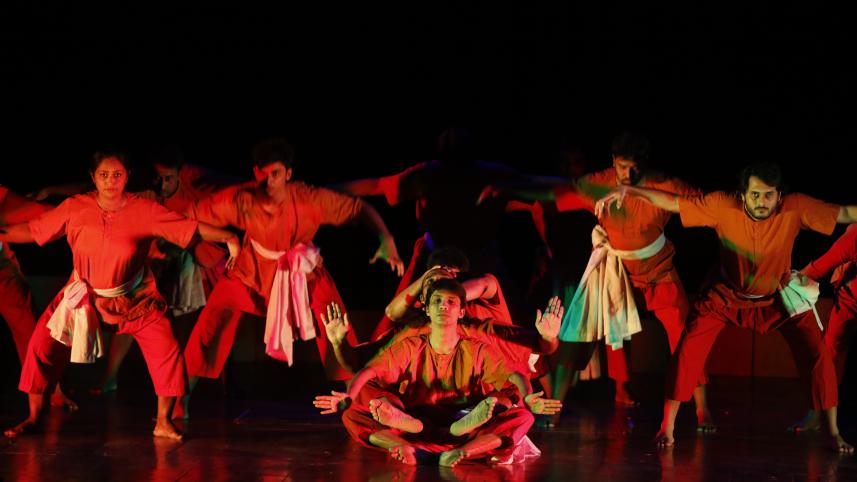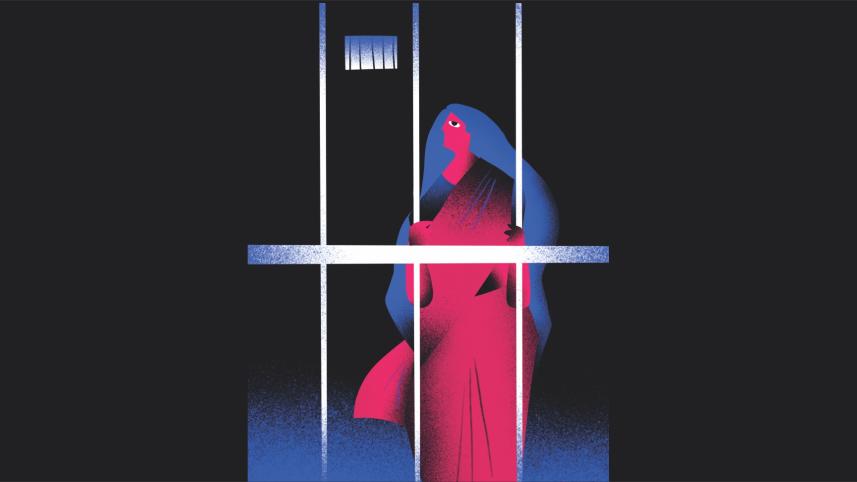Mohakal Natya Sampraday’s Ghum Nei’ mesmerises at Ganga-Jamuna Cultural Festival

As the lights turn off, the stage starts to vibrate with the sound of footsteps -- and then the audience sees a beautiful assembly of choreographed dance which wonderfully portrays the passion and energy surrounding a brutal battlefield as young blood rises up to the occasion to fight for the independence, a war against the oppressor, and true love for the nation.
The introductory scene builds up to the intensity of the play and soon the audiences were engulfed into the world of brutal battlefield, where death is inevitable and freedom is the only source for living. As the first scene ends the whole stage echoes with the background score "Ghum Nei" which aptly suits as the name of this play.
The amalgamation of golden and blue lights beautifully depicted the calm waves of the sea, while the ravages of the battlefield was escalated by the strong force of red light.
The drama beautifully depicted the raw stories of the 1971, and how the untold sacrifices of youths such as Somor, Rumi, and others gave birth to the creation of the freed nation named "Bangladesh."
After eight long years, theater troupe Mohakal Natya Sampraday staged its 109th adaptation of "Ghum Nei", based on a novel by the same name written by cultural personality and freedom fighter Nasiruddin Yousuff Bachchu.
Directed by John Martin, the Liberation War based play "Ghum Nei" was staged at the 5th day of the ongoing Ganga-Jamuna Cultural Festival show at the National Theatre Hall of Bangladesh Shilpakala Academy (BSA) on Tuesday. The notable play was first staged in 1994 at Bangladesh Mahila Samity.
Nasiruddin Yousuff talked toThe Daily Star about the vision behind writing the brilliant masterpiece.

"This is not simply just a work of fiction, every character and incident is based on real life occurrences. "Ghum Nei" is a reflection of some of the memories that I have experienced as a freedom fighter, while some that I have researched intensively to find out the truth," mentions Nasiruddin Yousuff.
"I have written this book almost in a poetical way as if my emotions were beautifully worded through my stream of consciousness. There are 3 incidents that are included in the book, for which I went to that place to do a proper research.
For instance, the story of Somor, the young man died during the Jamalpur war and as I was in Dhaka I didn't get to meet him personally. However, I went to Jamalpur, and there I talked with his friends, family and his colleagues to get to know his real life story," added the thespian.
Mir Zahid Hassan, founder and President of Mohakal Natya Sampraday, also talked about why there was just a huge gap of 8 years for the staging of the production.
"Due to shortage of halls and emerging of new production back then, we had to wait 8 years to stage this drama for the audiences," mentions Zahid Hassan.
While talking about the play, the founder of Mohakal Natya Sampraday stated that this play is a memoir of the liberation war. "Some of the freedom fighters are still alive, among whom are Nasiruddin Yousuff Bachchu, Habibur Alam (Bir Protik), Sahidullah Khan Badol. There are lots of freedom fighters who are still alive in various villages, some known to us while some stories are buried with time. These true stories are projected through this live performance," added Zahid.
"We tried to depict the true image of war through various props such as Lathi (sticks), drapes of white clothes, pradip (Light) and also through bodily movements.
Director John Martin who is living in Australia right now gave instruction to the team online.

"This was Martin bhai's first theatrical direction in Dhaka. This piece really means a lot for him and he gave us instruction during the whole rehearsal period so that we are able to give our best," stated the President of the theater group.
The drama depicts 10 chapters from the stories staring with the introductory part of Shahadat Chowdhury, and the river part which centers on Nasiruddin Yousuff's own life story as they were coming back to Dhaka after completing training in India. Later on the drama reflects the stories of Shahid Shafi Imam Rumi, Manik, field hospital scenes of Dr Zafrullah, Doctor Morshed, and Doctor Mubin. Jamlapur's Yussuf Ali, Chattragram "Operation Jackpot", and the tragic death of Shahid Titu.
Modern touches were added to the drama, to bring it up to date with the current landscape of theatre. Earlier on the lighting of the plays were done by Anirul Islam Tipu but Shankar Kumar Dhor and Nazrul Islam added their own modern touch and sense to the lighting. In addition, the choreography which was done by M A Azad was adapted by a new member of the troupe named Aminul Ashraf to add a different flavour to the show.



 For all latest news, follow The Daily Star's Google News channel.
For all latest news, follow The Daily Star's Google News channel.
Comments